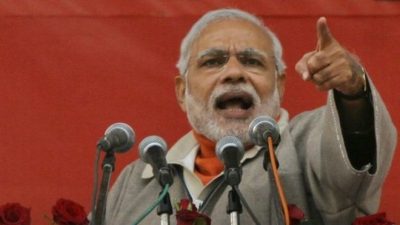By
Irfan Rashid
Indian Prime Minister Narendra Modi is scheduled to visit the conflict state of Indian Administered (Jammu and) Kashmir on November 7 where he is expected to announce a package of Rs 1 lakh crore ($13.7 bn US) for the state. But the biggest challenge against his rally in Kashmir is ‘Million March’, announced by pro-freedom leaders of the valley.
The pro-freedom leaders of Kashmir, including Chairman Hurriyat (G) Syed Ali Geelani, Chairman Hurriyat (M) Mirwaiz Umar Farooq and Jammu & Kashmir Liberation Freedom Leader Yaseen Malik have planned to confront the Indian PM with the plan of the ‘Million March’ near to the venue of the Sheri Kashmir cricket stadium—the location for the PM’s speech.
On October 27, a similar ‘Million March’ was held in New York under the banner of an All Parties Kashmiri ‘Million March’ as a mark of protest to show the world that the Kashmir dispute has yet to be settled according to the UN resolutions and as per aspirations of the Kashmiris.
The march was jointly sponsored by all groups who believe in the right of self-determination of the people of Kashmir. Hundreds of people had come from far off places such as Calgary, Toronto, Oslo, London, Illinois, California, Ohio, Pennsylvania, New Jersey, Connecticut, Massachusetts, Virginia, Maryland, Delaware and Washington, DC, to participate in the march.
More than sixty percent of the participants were women and children, oozing with enthusiasm. The protestors presented a memorandum to the Secretary General of the UN which urged the SG to use his good offices and appoint a person of international standing like President Mary Robinson, Bishop Desmond Tutu or Kofi Annan as his special envoy on Kashmir and persuade India and Pakistan to initiate a peace process with the association of United Nations as well as the genuine leadership of the people of Jammu & Kashmir. Similar street protests were held in Brussels as well to draw the attention of the European Union on the Kashmir dispute.
In a speech last week, Chief Minister of the disputed state, Mufti Syed branded Modi as “not communal” in his every public rally, just like an eyewitness to the murdered who keeps repeating: “I saw nothing.” The Constituent Assembly of Jammu and Kashmir (J&K) Chief Minister seemed very much defensive in protecting the coalition with Rashtriya Swayamsevak Sangh (RSS) led Bharatiya Janata Party (BJP) at the centre.
Mufti has perhaps changed the dictionary meaning of ‘communal’, as 2000 Muslims were butchered in Gujarat state when he was Chief Minister there.
When the People’s Democratic Party (PDP)—the party ruling in J&K along with BJP—came into power in 2002 in a coalition with the Congress party, it was spoken in very high tones of “self-rule”, a proposal that the disputed state must be governed by leaders from state only and minimal interference should come from the Indian government. But now in this coalition the concept appears to have been buried like 5000 mass graves buried in the state.
Just two days ago, the J&K Chief Minister inaugurated a citizens’ park in the summer capital of the state—Srinagar—and was again found to be defensive when he praised the Indian army for agreeing to vacate a piece of land. The irony is that the Indian army was supposed to vacate this land a couple of years ago when they were given replacement land to build a camp. But the state government was begging the Indian army to “please vacate the land” and now “thanks for vacating our own the land years after.”
Kashmir is the most militarised zone in the world where the 7 million strong Indian army is occupying illegally, making a ratio of 15 armless residents to 1 Indian armed trooper.
The Chief Minister was talking about the policy of ‘healing touch’ which is exposed as he detained all the pro-freedom leaders numbering nearly 300 including former militants. It was done in the wake of foiling the ‘Million March’ campaign of the pro-freedom camp.
Now the question is: How long will India continue to fool the world community about peace in Kashmir by announcing such ‘begging packages’, which in reality are ‘bureaucratic’ rather than ‘political packages’, which the people of the state have been demanding rights for since 1947 when Kashmir was independent and illegally taken away by India, when it sent its army here on October 27, 1947? Since then, Kashmir has celebrated that day as a black day.
Following which there is a pending resolution in the United Nations regarding a referendum to take place in the disputed territory of Kashmir, but India always feared the true results and had been reluctant.
On November 13, Modi is scheduled to visit the United Kingdom where an ‘Anti-Modi March for Free Kashmir’ protest rally has been organised outside Wembley Stadium in London, at 5:30 pm by British Kashmiri and will also be well supported by UK residents.
The message a common Kashmiri is sloganeering from the core of his heart to the Indian PM is: “Announce a political package because by giving us money you are not doing any greatness, as you are taking our electricity worth millions and billions.”


